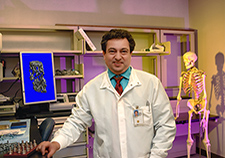Office of Research & Development |
 |

VA Research Currents archive
November 13, 2014

Dr. M. Neale Weitzmann, a research biologist at the Atlanta VA Medical Center, studies how the immune system drives bone formation and breakdown. (Photo by Adam Hernandez)
For older Veterans, the symptoms associated with rheumatoid arthritis can prove debilitating. A chronic inflammatory autoimmune disease, rheumatoid arthritis, or RA, leads to bone loss around inflamed joints, as well as a progressive loss of bone density across the entire skeleton that can lead to osteoporosis. Osteoporosis leaves patients at higher risk of fractures and other injuries.
The key to preventing or reversing bone loss in RA, according to Dr. M. Neale Weitzmann, a research biologist at the Atlanta VA Medical Center, is understanding the way the immune system drives bone formation and breakdown. Lymphocytes are white blood cells responsible for protecting the body from invaders. In osteoporosis caused by inflammatory conditions such as RA, lymphocytes secrete a hormone that stimulates the production of cells, called osteoclasts, that break down the patient's bones.
Weitzmann, also an associate professor of medicine at Emory University School of Medicine, wanted to see if by blocking a specific receptor on T cells, a type of lymphocyte, he could alter their effect on bone turnover.
"The CD28 receptor on a T cell provides the stimulation necessary for them to activate," says Weitzmann. "In effect, we wanted to see if we could suppress them temporarily to keep them from degrading a patient's skeletal system."
Over 12 weeks, Weitzmann and his team studied the effects on mice of a pharmacological anti-inflammatory drug called CTLA-4-Ig, which reduces T cell activation. CTLA4-Ig was indeed found to increase bone density, but surprisingly, bone accrual was a consequence of an increase in new bone formation, rather than reduced bone breakdown.
"Almost all the drugs currently in use for osteoporosis work by preventing further bone breakdown," says Weitzmann, "but they do not function effectively in regenerating the skeleton. So these findings were of great interest."
The results, published in April 2014 in the journal Arthritis & Rheumatology, suggest that bone loss associated with RA and multiple other diseases could be stopped, and possibly even reversed, by suppressing CD28 signals to T cells.
Though the study involved only mice, and many challenges remain, not the least of which is to identify the long-term consequences of blocking T-cell activation, Weitzmann remains confident.
"If everything goes as we plan, we could provide effective regenerative measures to repair damaged bone, rather than just preventing further bone loss," he says. "The standard of care for osteoporosis could change completely."